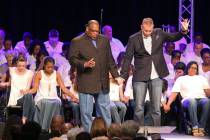VICTOR JOECKS: Reversing Roe would reduce conflict over abortion
Overturning Roe v. Wade would eventually reduce the intensity of the abortion debate.
On Monday night, a draft Supreme Court opinion leaked to Politico, showing the court may be poised to strike down Roe. Any sharing of a draft opinion with a news outlet before a decision is an institutional scandal. But it’s a ground-shaking institutional crisis that the decision involves this abortion case. The court confirmed Tuesday that the February draft opinion was genuine. That doesn’t mean the votes are set, however.
Being able to have vigorous, yet confidential, internal debate is vital to the court and its work. Justices can and do change their minds from their initial votes. Those changes shouldn’t come from external political pressure but from constitutional arguments and conversations that lead to compromises.
That isn’t happening now. President Joe Biden called it a “radical decision” if it holds. In a joint statement, Sen. Majority Leader Chuck Schumer and House Speaker Nancy Pelosi called the potential decision “an abomination.”
This pressure campaign has a clear purpose — to flip the votes of those willing to overturn Roe. Politico reported the majority includes all Republican-appointed justices except Chief Justice John Roberts. CNN later reported that Roberts would be willing to allow a ban on abortion after 15 weeks.
To guard against public intimidation, judges have lifetime tenure. That helps keep them loyal to the Constitution rather than swayed by the rantings of elected officials or public whim. But as Roberts reportedly showed in the Obamacare case, political considerations can change votes.
The best way to circumvent this is to issue the ruling immediately. If dissents have to come later, so be it. There’s a safety factor here, too. Rulings aren’t official until they are released. If, heaven forbid, one or more of the justices were to pass before the decision came out, it could change the outcome. Release it.
If the court’s final ruling ends up looking like the draft opinion, it will actually lower the stakes in the abortion debate. That’s because the opinion embraces judicial restraint. It overturns Roe, and then steps aside.
“The authority to regulate abortion must be returned to the people and their elected representatives,” Justice Samuel Alito’s draft opinion reads.
That’s how it should be. When the Constitution is silent, elected officials, not judges, should make the decision. That allows public debate and compromise. If one legislature passes an unpopular law, voters may elect someone else to change the law. This gives voters control, the opposite of Roe’s top-down nationwide mandate.
This allows Florida and California to have very different laws on abortion. Sadly, in Nevada, nothing will change immediately. But when Nevada voters decide it’s time to protect preborn babies, we’ll be able to if Roe is gone.
The abortion debate isn’t going away. In the short-term, overturning Roe would set off a political firestorm. That will likely include actual fires in some places. Democrats may be surprised at how many noncollege educated voters care more about controlling inflation than abortion on demand, however.
But in the long term, turning one winner-take-all war into 50 state-level battles will lower the temperature on this debate.
Contact Victor Joecks at vjoecks@reviewjournal.com or 702-383-4698. Follow @victorjoecks on Twitter.























